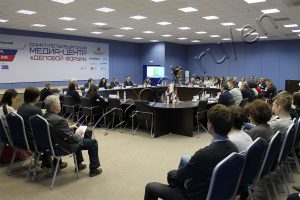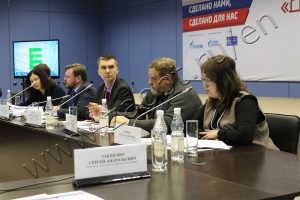Urban Ecology Week in St. Petersburg brought up waste management issues
On February 14, Import Substitution and Localization Centre in St. Petersburg (Lenexpo) conducted the panel session ‘City and garbage: how to struggle with waste’. It was a part of ‘urban ecology’ week in St. Petersburg. Waste management current situation and strategy of effective waste control were brought up during this session. The representative of Safe Technologies IG took part in this event.
Authorities, business management representatives and non-governmental organizations participated in solving the waste management problems at the roundtable discussions.
Government representatives highlighted the main changes in legislation. According to Dmitriy Krutoi, the Head of Hazardous Waste Management Sector of Natural Resource Management and Environmental Safety Committee in St. Petersburg, the changes in waste management field are revolutionary.
‘The key law №89 of Federal Law on Production and Consumption waste: regulations are being expanded and specified. It took more than 10 years of discussion before these regulations were adopted. Now the manufacturer’s responsibility is increased, strengthened and legislated. The concept of waste management regional operator was introduced.’
There were no such changes except for the ones on legislative level. However, all the participants agreed to start with separate waste collection. The next stage is waste processing and its utilization.
‘We are monitoring utility waste accumulation at our own expense because we are concerned about mixing of the household wastes with the hazardous industrial or medical ones. This problem has not been solved yet,’ said Leonid Weisberg, Academician, the Director General of Mechanobr-Tekhnika Research and Engineering Corporation.
According to Kirill Pashchenko, the Deputy Chairman of the Redevelopment Committee of St. Petersburg, the first step towards separate waste collection was commenced. The landfill depositing of unsorted waste, containing valuable fractions, has been prohibited since January 1, 2017.
‘We have law and structure in waste management field, whether it is good or not. If we did not prevent the waste generation and did not turn it into a valuable source, then we must reduce its hazard class in the places of waste accumulation. It is impossible without separate waste collection, the first stage. The next one is utilization, including thermal treatment and processing,’ noted Anna Garkusha, the representative of environmental movement Separate collection.
She also emphasized the improvement in this direction: many locations of waste separate collection are now running successfully in St. Petersburg due to the growth of education level and increasing number of voluntary and non-governmental organizations. Business corporations start to bear the responsibility as manufacturers and promote separate waste collection in residential areas, shopping malls, supermarkets, etc. Another reason is rate increase in waste depositing at the landfills. Home Unit Company and managing companies concluded that separate waste collection is even cost-effective: the garbage is collected free either of charge or at a bargain price.
Safe Technologies IG is a manufacturer of the equipment for thermal treatment of waste. Its representative, Olesya Epinina, acknowledged the importance of waste separation, ‘Waste of 1-3 hazard class must be separated from the total waste flow and treated in a particular way. It means that after the extraction of secondary materials, the waste can be incinerated or processed more easily. It is prohibited to incinerate mercury-containing wastes while medical and oil-containing ones are applicable.
The progress in the field of separate waste collection is now obvious due to the increasing demand in thermal treatment facilities. Concerning separate waste collection, these efforts are not enough. Every person should be aware of this threat. It must be solved on the legislative level.’
Implementation of such approach started on the regional level. According to Nikolay Borisov, the Head of Waste Management and Control Department of Leningrad Region, MSW collection is now being managed in a proper way; each landfill in Leningrad Region will possess its own waste sorting station during 2017.

